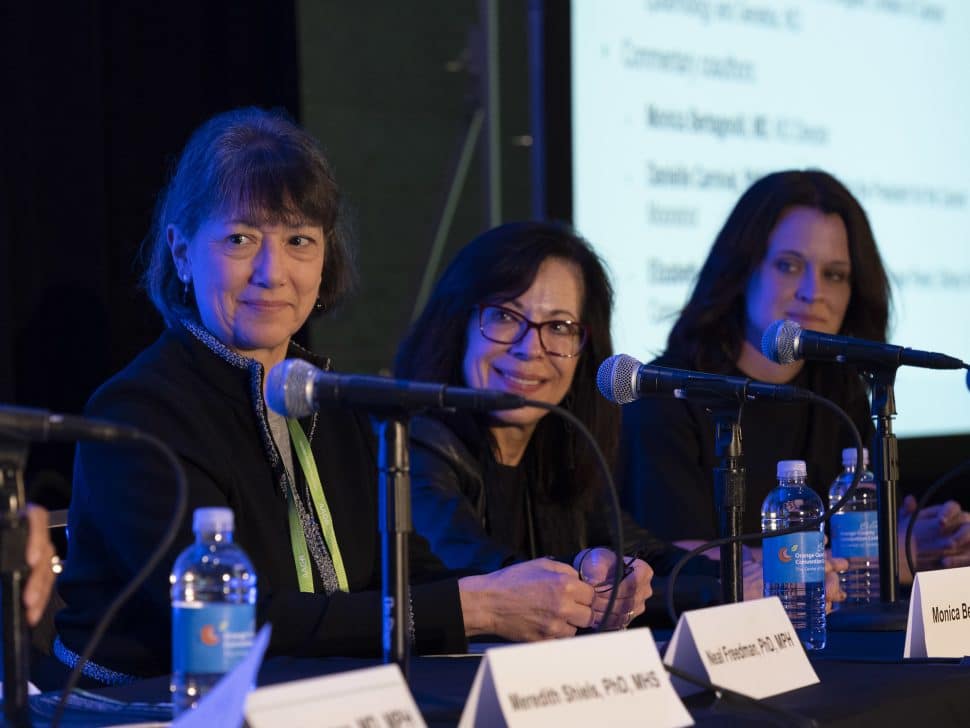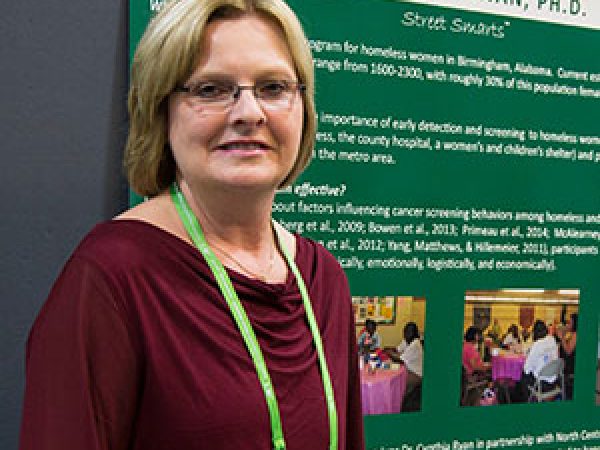AACR Annual Meeting 2023: NCI Director Shares National Cancer Plan
When Monica Bertagnolli, MD, was appointed director of the National Cancer Institute in 2022, she became the first woman to hold the post.
A few months later, she became the first director to publicly share a cancer diagnosis. On Monday, in a Fireside Chat with AACR President Lisa M. Coussens, PhD, FAACR, at the AACR Annual Meeting 2023, Bertagnolli, who has undergone several months of breast cancer treatment, said she is feeling well and has a good prognosis.
As Bertagnolli made the rounds of the Annual Meeting, many attendees thanked her for sharing her cancer diagnosis with the public. But as she discussed her priorities for NCI and shared details of the recently unveiled National Cancer Plan, Bertagnolli asserted that her personal experience won’t dramatically change her plans for leading NCI. While she is grateful to have benefited from excellent care, she simply wants to ensure that every American faced with a cancer diagnosis can benefit equally.
“I had a diagnosis based on adherence to screening, it was treated effectively, and I can expect to live a full and healthy life. We want this for everyone,” she said. “I want everyone to have the same outcome that I expect to have.”
The National Cancer Plan comprises eight goals, written in plain language and designed for all Americans to understand and employ. They are:
- Prevent cancer
- Detect cancer early
- Develop effective treatments
- Eliminate inequities
- Deliver optimal care
- Engage every person
- Maximize data utility
- Optimize the workforce
Can we achieve the Moonshot goals?
The National Cancer Plan is closely entwined with the reignited Cancer Moonshot Plan, which was unveiled by President Biden this past February. “Moonshot priorities are National Cancer Plan priorities; there’s no dividing line between the two,” Bertagnolli said. Her presence at the Annual Meeting coincided with the Monday release of a new paper published in AACR journal Cancer Discovery examining the likelihood of achieving the Cancer Moonshot goal of reducing the cancer death rate by 50% by 2047.
Coauthors Meredith Shiels, PhD, MHS, and Neal Freedman, PhD, MPH, both senior investigators with the Division of Cancer Epidemiology and Genetics at NCI, examined mortality trends between 2000 and 2019 for all cancers, with a particular focus on the six leading causes of cancer death (lung, colorectal, pancreatic, breast, prostate, and liver cancer). These six cancers account for 56% of cancer deaths in men and 57% of cancer deaths in women, lending significant weight to the U.S. cancer burden.
The researchers discovered some encouraging trends. Overall cancer death rates declined by 1.4% per year from 2000 to 2015, then the declines accelerated to 2.3% per year during 2016 to 2019. The primary driver of this progress was a 4.7% annual decline in lung cancer mortality.
However, they detected some areas of concern, such as an increase in pancreatic cancer incidence and a predicted increase in mortality. Some rarer cancers, such as uterine cancer, are also increasing in incidence and are demonstrating significant disparities in outcomes for racial and ethnic minorities.
Overall, if current trends continue, the cancer death rate will have declined by 44% in 2047, Shiels and Freedman estimated. Achieving a full 50% reduction will require a concerted effort on prevention and early detection, along with continued efforts to develop new treatments for the six major cancers and the many rarer cancer types alike, the authors wrote.
At a press conference discussing the study, Shiels and Freedman said a few key strategies could help the United States accelerate progress and achieve the Moonshot’s aims. These include reducing smoking rates (and preventing young people from ever starting smoking); increasing access to evidence-based early detection and treatment strategies; and investing in ongoing discovery.
“This is a very important study for us,” Bertagnolli said in a press conference. “It gives us direction and focus to think about as we try to achieve this goal. It sheds light on what it would mean to ‘end cancer as we know it.’”
Bertagnolli, Danielle Carnival, PhD, deputy assistant to the President for the Cancer Moonshot, and AACR Past President Elizabeth M. Jaffee, MD, FAACR, coauthored a commentary on the Cancer Discovery paper, expanding on the research presented by Shiels and Freedman. They identified some additional concerns, such as a rise in obesity, a known risk factor for more than a dozen cancer types.
They also advocated for a sharp focus on eliminating cancer health disparities, noting that incidence and mortality vary not only across racial and ethnic groups, but also according to social determinants of health, such as educational attainment and geographic location.

The Faces Behind the Figures
Carnival reminded meeting attendees that every advance against cancer translates into countless lives that are saved or greatly improved.
“The numbers only matter because there are people behind those numbers. That’s a tremendous number of people who get to attend more birthday parties … who get to walk their daughter down the aisle at her wedding,” Carnival said.
As the Annual Meeting’s 21,000 attendees looked ahead to the next wave of progress against cancer, Bertagnolli took a moment to reflect on how the progress of the past couple of decades might have saved a cherished mentor.
Bertagnolli trained as a surgeon at Brigham and Women’s Hospital in Boston under Richard Wilson, MD. She described him as a tough but nurturing mentor who helped her pursue rigorous training and exciting professional opportunities. He developed melanoma and fought through brutal treatments before dying of the disease in 1989 at age 60.
Today, Bertagnolli reflected, patients with melanoma often benefit greatly from treatment with immunotherapy, with longer survival and fewer punishing side effects. She said she can’t help but wonder what Wilson’s prognosis would have been had he been diagnosed in the modern era.
“I still think of all the lives he could have saved,” she said. “However, our progress against melanoma illustrates how far we have come. Many of you in the room remember how often we failed before we achieved this success. We all need to move forward with both purpose and confidence.”
This video features further coverage of Bertagnolli’s appearance at the Annual Meeting.



